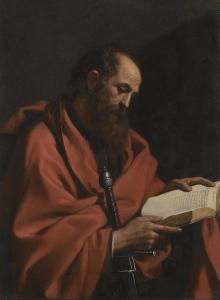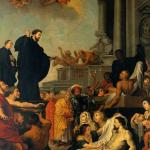Reply to False Caricatures of Apologists Over Against Documented Biblical Views
There is a strain of thought floating around today, which has infiltrated the Catholic Church, to the effect that apologetics is something that one ought to be ashamed of, as if it is merely a self-serving, arrogant, know-it-all enterprise (and apologists, pompous pretenders). We apologist-types supposedly get an “I told you so!” charge out of telling people when they are wrong, as if that is the sole factor that defines and gives meaning to what we do. It’s one of many negative stereotypes of apologists. Heaven knows, there are self-described apologists who do fall into this description (we being human and fallen like everyone else), but it’s by no means an accurate representation of the whole. And as such, it is a species of prejudice.
It’s not just a supposed air of superiority that marks the apologist (so we are told), which frosts many people, but the very notion and concept that anyone can deign to tell anyone else that they are wrong (tough love / “faithful are the wounds of a friend” /the biblical rebuke) — and that very unpopular, unfashionable traditional teachings are right — that are under fire. We’re in a postmodernist world now. Everything is subjective. Everyone’s truth is their own. Absolute truth is a quaint fable, held only by old-fashioned, naive, fuddy-duds. And I believe that is ultimately what lies behind this antipathy to apologetics, along with a certain virtue-signaling, “woke”, holier-than-thou, smarter-than-thou elitism that is especially prevalent today on the political left.
It’s certainly true that anyone can start a blog and start calling himself an “apologist” without credentials. It’s also equally true that legitimate apologists with credentials can start blogs and have multiple ways of being accountable. First of all, lay apologetics is enthusiastically sanctioned and encouraged by the Catholic Church and by popes, and has a long and storied history.
Secondly, there are all sorts of means of accountability. In my own case (which I can authoritatively speak to!), as far back as 1993, before I ever got online, my first book, A Biblical Defense of Catholicism was warmly recommended (in what is now the Foreword: available online) by the late Servant of God Fr. John A. Hardon, SJ, who was widely considered to be the foremost catechist in America before the Catechism came out. He was also an advisor to both Pope St. Paul VI and St. Teresa of Calcutta (Mother Teresa) and her Missionaries of Charity. That’s being “accountable to no one”? That’s not supervision?
Lay apologetics is an activity that has (or should have, if individuals lack this) many networks of accountability. So, for example, I am published by about seven different Catholic publishers. These in turn often have oversight (or at least commendation) from bishops. The same is true of Catholic Answers, a lay apologetics organization, which has the approval of many bishops, as I have written about and documented in the past. I’ve written several articles for them, been on Catholic Answers Live twice, and had a book published by them.
The same is true of apostolates like The Coming Home Network, for whom I worked for three years as a forum moderator, or National Catholic Register, for which I have written 261 articles over the last five years. I also have two Imprimaturs for works of mine. Before I ever started a website / blog, my first book: later to be published by Sophia Institute Press, was already complete. I had been published in several Catholic magazines, and my conversion story was included in Patrick Madrid’s runaway bestseller Surprised by Truth in 1994.
It’s not Catholic teaching that any apologist or priest or DRE or nun or anyone else who is called to a particular apostolate or vocation as a full- or part-time Christian worker are mere worms, while God gets all credit for everything and we fallen, miserable, wicked human beings never get any at all. That may be Calvinism, but it ain’t Catholicism or Bible teaching.
Some want to make out that we apologists are always going around with our noses so high up in the air that we would drown in a thunderstorm, pridefully and foolishly crediting ourselves with the work that is ultimately the Holy Spirit’s, and thinking we are really “something” and superior to underlings because someone might have said they came into the Church as a partial result of something we wrote (or said). Anyone who knows anything at all, theologically and spiritually, knows that God’s grace is the ultimate cause of all salvation, repentance; indeed, of any good thing whatsoever that any human being does. DUH! But it doesn’t follow that God is the only cause. He Himself told us so through His inspired revelation, the Bible.
It’s critics of apologetics and apologists who arguably exhibit excessive pride. They are sure putting out an impression of being proud of their supposed humility and feeling that they are “not like other men”: as Jesus said of the prideful Pharisee (Lk 18:11, RSV). I again use myself as an example of one such “lay apologist”. I have always taken great pains to give glory to God if someone thanks me for having aided them in becoming Catholic or returning to the Church. I will say “thanks” but immediately add (usually) “all glory to God always.”
I try to learn from and emulate my mentor, Fr. Hardon in this respect. In my tribute to him, written just two days after he died (1 January 2001) I recounted a story about him:
Fr. Hardon’s manifest virtue of humility was one of his leading character traits. He would habitually refer to himself as “this sinner,” which always reminded me of the Apostle Paul calling himself “the chief of sinners.” The last time I saw him was about a year ago at a conference for Catholic radio, where he was to be given a well-deserved award for lifetime achievement. I knew that he would be very uncomfortable with this because undoubtedly he would regard it as improperly extolling him. Yet he was far too courteous to ever consider refusing to accept the honor. His words upon receiving the award were entirely what I expected from such a humble servant of God. He rose from his chair in the middle of the crowd. I paraphrase, but his entire “acceptance speech” was essentially as follows: “Thank you very much. To God be all the glory — all the glory.” If I remember correctly, he also blessed the audience. And then he sat down.
When I wrote about 156 documented cases where someone gave me partial credit for their becoming Catholic or returning to the Church, I noted in the subtitle that this was “Completely Caused by God’s Grace.” My opening words of introduction were:
All glory to God always, for everything. We are just vessels, if He uses us to spread the message to someone else: one sinning beggar sharing spiritual food with other beggars. It all goes back to God and His grace in the end. No one can do the slightest good thing without it. Praise Him!
I’ve been doing apologetics and evangelism for now 40 years: the first nine as a Protestant. This was always my opinion. I had great instruction and theological and spiritual formation as a Protestant and as a Catholic.
Now I want to show what the Bible actually teaches about such matters. God (rather strikingly) refers to us as His fellow workers:
Mark 16:20 (RSV) And they went forth and preached everywhere, while the Lord worked with them . . .
Romans 15:17-19 In Christ Jesus, then, I have reason to be proud of my work for God. [18] For I will not venture to speak of anything except what Christ has wrought through me to win obedience from the Gentiles, by word and deed, [19] by the power of signs and wonders, by the power of the Holy Spirit, so that from Jerusalem and as far round as Illyr’icum I have fully preached the gospel of Christ,
1 Corinthians 3:9 . . . we are God’s fellow workers . . . (KJV: “labourers together with God”)
1 Corinthians 15:9-10 For I am the least of the apostles, unfit to be called an apostle, because I persecuted the church of God. [10] But by the grace of God I am what I am, and his grace toward me was not in vain. On the contrary, I worked harder than any of them, though it was not I, but the grace of God which is with me.
1 Corinthians 15:57-58 But thanks be to God, who gives us the victory through our Lord Jesus Christ. [58] Therefore, my beloved brethren, be steadfast, immovable, always abounding in the work of the Lord, knowing that in the Lord your labor is not in vain.
2 Corinthians 6:1 Working together with him, then, we entreat you not to accept the grace of God in vain.
Philippians 2:13 for God is at work in you, both to will and to work for his good pleasure.
God (mostly communicating via St. Paul) goes beyond that. He gives us partial credit for spreading His grace:
2 Corinthians 4:15 For it [his many sufferings: 4:8-12, 17] is all for your sake, so that as grace extends to more and more people it may increase thanksgiving, to the glory of God.
Ephesians 3:2 assuming that you have heard of the stewardship of God’s grace that was given to me for you . . .
Ephesians 4:29 Let no evil talk come out of your mouths, but only such as is good for edifying, as fits the occasion, that it may impart grace to those who hear.
1 Peter 4:10 As each has received a gift, employ it for one another, as good stewards of God’s varied grace:
St. Paul is so gung-ho on the notion of his distributing grace to folks, that he mentions this at the beginning of practically every epistle that he wrote. When Paul and others use the common greeting of “grace to you” (e.g., Rom 1:7; 1 Cor 1:3; 2 Cor 1:2; Gal 1:3; Eph 1:2; Phil 1:2; Col 1:2; 1 Thess 1:1; 2 Thess 1:2; Phlm 1:3; Rev 1:4) it is in the sense of “may God give you more grace.” St. Paul is stating that he hopes and prays that his readers will receive more grace from God, as in the sense of 2 Peter 3:18; Ephesians 4:7; James 4:6; 1 Peter 1:2; 2 Peter 1:2, etc. And in so doing he is acting, again, as a sort of “mini-mediator.” Jesus is ultimately the mediator of grace. It all comes through Him. But He also clearly uses human beings to distribute the grace, allowing others to attain salvation, as these passages establish beyond any doubt.
God even gives us partial credit for being vessels or conduits of His salvation:
Psalm 51:13 Then I will teach transgressors thy ways, and sinners will return to thee.
Acts 2:38-41 And Peter said to them, “Repent, and be baptized every one of you in the name of Jesus Christ for the forgiveness of your sins; and you shall receive the gift of the Holy Spirit. [39] For the promise is to you and to your children and to all that are far off, every one whom the Lord our God calls to him.” [40] And he testified with many other words and exhorted them, saying, “Save yourselves from this crooked generation.” [41] So those who received his word were baptized, and there were added that day about three thousand souls.
Acts 11:12-14 And the Spirit told me to go with them, making no distinction. . . . [13] And he told us how he had seen the angel standing in his house and saying, `Send to Joppa and bring Simon called Peter; [14] he will declare to you a message by which you will be saved, you and all your household.’
Romans 11:13-14 Now I am speaking to you Gentiles. Inasmuch then as I am an apostle to the Gentiles, I magnify my ministry [14] in order to make my fellow Jews jealous, and thus save some of them.
1 Corinthians 1:21 For since, in the wisdom of God, the world did not know God through wisdom, it pleased God through the folly of what we preach to save those who believe.
1 Corinthians 7:16 Wife, how do you know whether you will save your husband? Husband, how do you know whether you will save your wife?
1 Corinthians 9:22 I have become all things to all men, that I might by all means save some.
2 Corinthians 1:6 If we are afflicted, it is for your comfort and salvation; . . .
1 Timothy 4:16 Take heed to yourself and to your teaching: hold to that, for by so doing you will save both yourself and your hearers.
2 Timothy 2:10 Therefore I endure everything for the sake of the elect, that they also may obtain salvation in Christ Jesus with its eternal glory.
James 5:15 And the prayer of faith shall save the sick, and the Lord shall raise him up; and if he have committed sins, they shall be forgiven him.
James 5:19-20 My brethren, if any one among you wanders from the truth and some one brings him back, [20] let him know that whoever brings back a sinner from the error of his way will save his soul from death and will cover a multitude of sins. [this puts the lie to Alt-Left’s assertion: “The Holy Spirit alone keeps Catholics in the Church.”]
1 Peter 3:1 Likewise you wives, be submissive to your husbands, so that some, though they do not obey the word, may be won without a word by the behavior of their wives
God even chooses to share His glory with us: His creatures, as I have shown in many Bible passages.
Apologetics is important because 1) the Bible, and 2) the Church say it is. Period. End of story.
***
*
Photo credit: St. Paul, by Guercino (1591-1666) [public domain / Wikimedia Commons]
***
Summary: Some critics of apologetics claim that only the Holy Spirit makes converts and that it’s certainly not men who do it. Not! Scripture sez men (even apologists) help, too!














